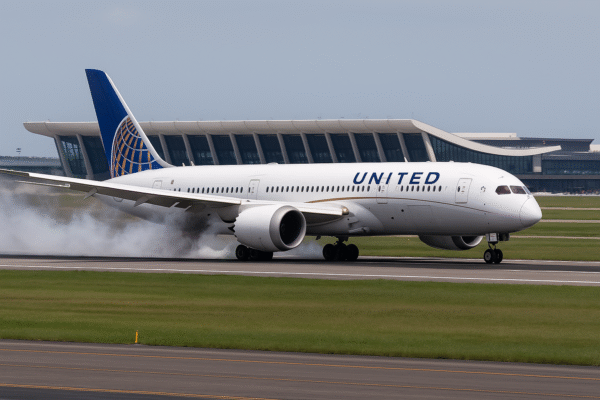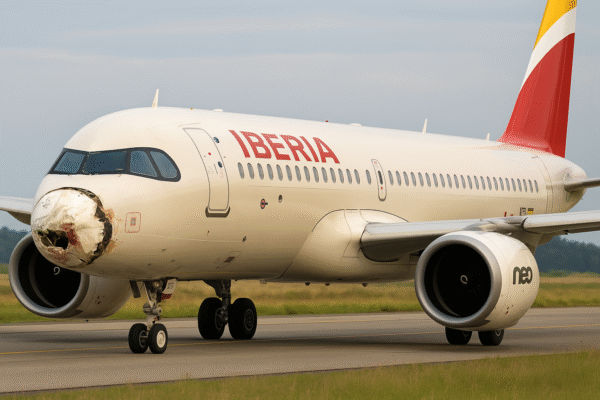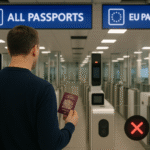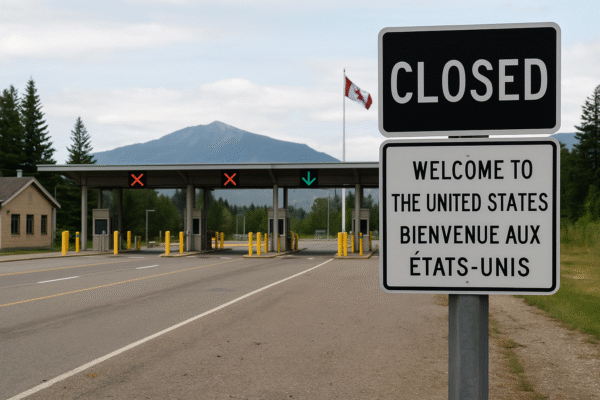In a rare but serious aviation incident, Iberia Airlines Flight IB579 en route from Madrid-Barajas Adolfo Suárez Airport to Paris Orly Airport was forced to return shortly after takeoff due to a mid-air bird strike. The Airbus A321XLR, one of the newest additions to Iberia’s fleet, sustained significant damage to its nose radome and weather radar after colliding with a large bird, believed to be a vulture. The flight’s swift return and safe landing underscore the professionalism of the flight crew and the airline’s commitment to passenger safety.
The Incident: A Sudden Challenge Minutes After Takeoff
The flight took off from Madrid at approximately 6:40 p.m. local time. Only minutes into its journey, the aircraft encountered a bird at cruising altitude over central Spain. The impact severely damaged the nose radome—an essential component housing the weather radar system—and affected fan blades in the left engine.
Initial cockpit warnings indicated a potential engine fire, prompting an immediate declaration of emergency. However, it was later confirmed to be a false alarm. The flight crew, following standard aviation emergency procedures, coordinated with air traffic control and safely returned the aircraft to Madrid within 30 minutes of takeoff.
Iberia’s Swift Response: A Model of Crisis Management
Despite the unexpected turn of events, Iberia demonstrated remarkable efficiency in managing the situation. The airline quickly mobilized a replacement aircraft—a modern Airbus A320neo—which departed Madrid at 8:29 p.m. and successfully landed in Paris at 10:12 p.m., minimizing passenger delays to under four hours.
Iberia’s ground and customer service teams worked seamlessly to rebook and accommodate passengers, maintaining transparency and calm throughout the process. No injuries were reported, and all passengers and crew were safely transported to their final destination.
Technical Assessment and Aircraft Downtime
The damaged Airbus A321XLR was immediately towed from the runway and moved to a maintenance hangar for a detailed inspection. The radome, critical for weather and storm detection, will require complete replacement. Furthermore, the engine fan blades are undergoing non-destructive testing to evaluate further structural damage.
Industry experts estimate that the aircraft may be grounded for several weeks. Iberia has already notified the European Union Aviation Safety Agency (EASA) and the Spanish Civil Aviation Authority, complying with international safety reporting standards.
Bird Strikes: A Known Aviation Hazard
While rare, bird strikes remain a persistent threat in global aviation. According to the International Civil Aviation Organization (ICAO), over 90% of bird strikes occur during takeoff or landing phases. Airports like Madrid-Barajas implement various bird mitigation strategies, including falconry programs, bio-acoustic deterrents, and advanced radar surveillance.
Spain’s diverse avian population, especially in rural and mountainous regions, includes species such as vultures and hawks that are large enough to cause significant aircraft damage. The Spanish Environment Ministry continues to collaborate with aviation authorities to monitor bird migratory patterns and improve airport wildlife management programs.
The A321XLR: Iberia’s Modern Marvel Temporarily Grounded
Introduced in late 2024, the Airbus A321XLR represents a new generation of long-range narrow-body aircraft. With enhanced fuel efficiency, extended range up to 4,700 nautical miles, and modern cabin design, the A321XLR is central to Iberia’s strategy for expanding medium- and long-haul operations across Europe and North America.
Iberia currently operates two A321XLRs, with eight more on order. While this incident is a setback, the airline remains confident in the aircraft’s capabilities and safety profile. Airbus has been notified of the bird strike and is assisting Iberia’s maintenance teams with technical support.
Passenger Safety and Industry Preparedness
This incident reinforces the importance of rigorous pilot training, emergency protocols, and prompt airline communication. Iberia’s flight crew acted with utmost professionalism under pressure, ensuring all 190 passengers aboard flight IB579 remained calm and secure throughout the emergency return.
Moreover, the airline’s proactive customer service and prompt aircraft substitution highlight a broader industry trend toward resilience and passenger-centric operations during disruptions.
Government and Regulatory Oversight
Spain’s aviation regulator, AESA (Agencia Estatal de Seguridad Aérea), has launched an internal review to assess the bird strike and evaluate whether enhancements to bird detection and avoidance systems are needed at Madrid-Barajas. The European Union Aviation Safety Agency may also consider recommendations for airports situated near natural bird habitats.
Meanwhile, Eurocontrol and the Spanish Air Navigation authority (ENAIRE) are collaborating to review airspace data to determine if additional advisories can be issued to pilots during high-risk times such as bird migration seasons.
Looking Ahead: Lessons Learned and Future Safety Measures
While the bird strike incident involving Iberia Flight IB579 was an unexpected event, it ultimately serves as a case study in effective aviation safety management. The airline’s swift response, operational agility, and prioritization of passenger welfare are commendable and align with global best practices.
As air travel continues to rebound and expand across Europe, airlines, airports, and regulators must remain vigilant in their efforts to mitigate natural and operational hazards. For Iberia, this event may be a temporary setback—but it also reinforces the resilience and professionalism that define its operations.
For more travel news like this, keep reading Global Travel Wire




















